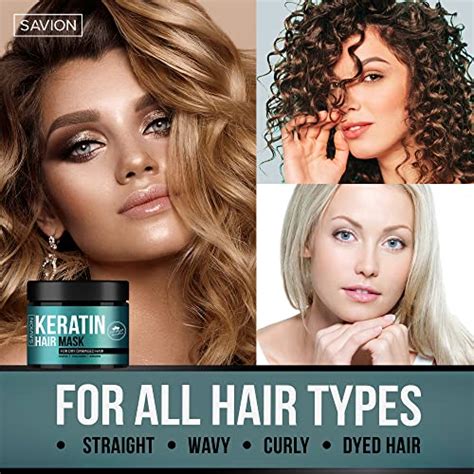Discover the 3 Wonders of Protein Hair Therapy

Are you tired of dealing with dry, brittle, and lifeless hair? Protein hair therapy may be the solution you’ve been looking for. This revolutionary treatment provides deep nourishment and strength to damaged hair, transforming it into healthy and radiant locks.
What is Protein Hair Therapy?
Protein hair therapy is a process of replenishing lost protein in the hair. Hair is primarily composed of a protein called keratin, which gives it its strength and elasticity. However, external factors such as heat styling, chemical treatments, and environmental stressors can strip the hair of its natural proteins.
Protein hair treatments replenish lost keratin, strengthening the hair shafts, improving elasticity, and reducing breakage. They can be applied in various forms, including shampoos, conditioners, masks, and leave-in treatments.
Benefits of Protein Hair Therapy
Protein hair therapy offers numerous benefits for damaged and weakened hair, including:
- Increased Strength and Elasticity: Replenished keratin strengthens the hair shaft, making it more resilient to breakage and damage.
- Improved Hydration: Proteins help seal in moisture, preventing dryness and restoring a healthy shine.
- Reduced Frizz: Protein molecules smooth the hair’s cuticle, reducing frizz and tangles.
- Enhanced Curl Definition: For curly and coily hair types, protein can enhance curls, making them more defined and bouncy.
- Protection Against Damage: Protein-rich treatments create a protective barrier on the hair, reducing the effects of heat styling and environmental stressors.
Types of Protein Hair Treatments
Various protein hair treatments are available, each offering tailored benefits:
- Hydrolyzed Keratin: A broken-down form of keratin that easily penetrates the hair shaft, providing deep repair.
- Collagen: A protein found in the skin and hair, collagen provides strength and elasticity.
- Silk Protein: A luxurious protein that imparts smoothness and shine, reducing friction and tangles.
- Soy Protein: A plant-based protein that nourishes and repairs damaged hair, promoting growth.
How to Choose the Right Protein Treatment
Selecting the appropriate protein hair treatment depends on your hair type and the severity of damage:
- Damaged Hair: Look for treatments containing intense proteins like hydrolyzed keratin or collagen.
- Thin Hair: Choose treatments with lighter proteins like silk or soy protein to avoid weighing hair down.
- Curly Hair: Treatments with keratin or collagen can enhance curl definition and reduce frizz.
- Colored Hair: Opt for treatments that are specifically designed for colored hair, protecting the dye while repairing damage.
Application of Protein Hair Treatments
Protein hair treatments can be applied in the following steps:
- Wash your hair with a clarifying shampoo to remove any product buildup.
- Apply the protein treatment to damp hair, distributing it evenly.
- Leave the treatment on for the recommended time, typically 15-30 minutes.
- Rinse the treatment thoroughly with warm water.
- Condition your hair as usual.
Common Mistakes to Avoid
To ensure the effectiveness of protein hair therapy, avoid the following common mistakes:
- Overuse: Excessive use of protein treatments can lead to protein buildup, causing hair to become stiff, brittle, and prone to breakage.
- Incorrect Application: Always follow the manufacturer’s instructions for application time and frequency.
- Ignoring Conditioner: Using a conditioner after a protein treatment is crucial for balancing the effects and preventing dryness.
- DIY Home Remedies: Attempting DIY protein hair treatments with household ingredients can be ineffective and potentially harmful.
- Mixing Incompatible Ingredients: Mixing protein treatments with certain products, such as those containing sulfates, can diminish their effectiveness.
FAQs
1. How often should I use protein hair treatments?
The frequency depends on your hair type. Generally, once every 2-4 weeks is sufficient for most hair types.
2. Can I use protein hair treatments on colored hair?
Yes, but choose treatments specifically designed for colored hair to avoid fading or discoloration.
3. Will protein hair treatments make my hair greasy?
No, they typically do not make hair greasy. However, overusing protein treatments or those that contain heavy oils can lead to buildup.
4. How long do the results of protein hair treatments last?
The results can last several weeks, depending on your hair type and the frequency of washes.
5. Can I use protein hair treatments on relaxed or straightened hair?
Yes, but use them cautiously and in moderation to avoid over-processing the hair.
6. Are protein hair treatments safe for all hair types?
Most hair types can benefit from protein hair therapy. However, individuals with extremely damaged or chemically treated hair should consult with a hair professional before use.
Conclusion
Protein hair therapy is a powerful solution for treating damaged and weak hair. By replenishing lost proteins and strengthening hair shafts, protein treatments can restore health, vitality, and beauty to your locks. However, understanding your hair type and choosing the appropriate treatment is crucial to achieve the desired results. By following the guidelines and avoiding common mistakes, you can transform your hair into a cascade of strength, shine, and resilience.
